Diplomatic Bluebook 2016
Chapter 3
Japan’s Foreign Policy to Promote National and Worldwide Interests
8.Women
Prime Minister Abe has been calling for realizing “a society where all women shine,” and strengthening its efforts to that end.
(1) World Assembly for Women, “WAW! 2015”
Two years in a row, Prime Minister Abe took the initiative to host the second World Assembly for Women “WAW! 2015,” on August 28 and 29 where 145 leaders of various field surrounding women from eight international organizations and 42 countries (nearly double compared to the previous year). The theme of 2015 was “WAW! for All.” Japan sent a message to change their societies together with men and women from diverse backgrounds and generations. Participants discussed and called for a change in current way of working that disturbs women from social participation and in mindset about role sharing between men and women. Hearing the voice of young people as well as women in trouble, participants also discussed disaster risk reduction, entrepreneurship, education, peace-building, and other global issues surrounding women. This year’s proposal was sent out as “WAW! To Do 2015” after the discussions, and distributed as a UN document (A/C.3/70/3) following the 2014 version.
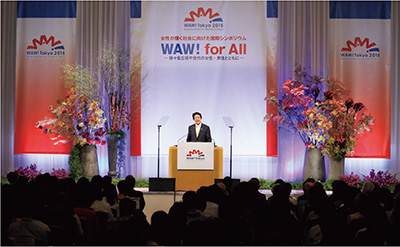 Prime Minister Abe addressing in the opening session of WAW! 2015
Prime Minister Abe addressing in the opening session of WAW! 2015(August 28, Tokyo; Photo: Cabinet Public Relations Office)
(2) International Cooperation for the Empowerment of Women in Developing Countries
During the General Debate Session at the General Assembly in 2013, Prime Minister Abe announced that the Government also provides official development assistance(ODA) of more than three billion US dollars over three years for three areas with a focus on the empowerment of women: the Government facilitates women’s participation in society and women’s empowerment; enhances Japan’s efforts in the area of women’s health care as a part of the Strategy on Global Health Diplomacy; and supports women’s participation and protects their rights in the area of peace and security. Japan had implemented the above for the two years until 2014. The Japanese first lady Akie Abe had a talk with US first lady Michelle Obama, when she visited Japan in March 2015, on the current situation surrounding girls’ education in developing countries and measures to address challenges. Also, the fact sheet released by both the Governments of Japan and the US stated that Japan will implement ODA amount to more than 42 billion yen over three years starting 2015 in the field of empowerment of women and girls (capacity building) and gender-sensitive education related areas.
(3) Women Issues in the UN, and Beijing+20
A. In celebration of the 20th anniversary of the 4th World Conference on Women (WCW) (Beijing Conference) in 1995, the 59th Commission on the Status of Women was held in March 2015. The Japanese delegation included Parliamentary Vice-Minister for Foreign Affairs Uto as Head of Delegation, Ms. Hiroko Hashimoto as Representative of Japan, representatives from ministries and agencies, the Japan International Cooperation Agency (JICA) and NGOs. At the meeting, Parliamentary Vice-Minister Uto made a statement regarding the efforts promoted in Japan including the 3rd Basic Plan for Gender Equality, the enactment of a bill to promote women’s participation and advancement in the workplace, the review of the 4th Basic Plan for Gender Equality, the strengthening of cooperation with the United Nations Entity for Gender Equality and the Empowerment of Women (UN Women), and the assistance for a project to eradicate violence against women in armed conflicts. In December, Parliamentary Vice-Minister for Foreign Affairs Miki Yamada attended the meeting in Istanbul, “Ending violence Against Women,” co-hosted by the UN Women, the UN Population Fund (UNFPA), and the Turkish Government. In her remarks, she introduced Japan’s initiative to promote active engagement of women in society.
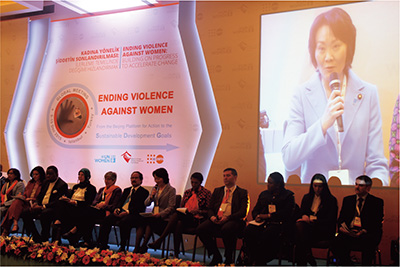 Parliamentary Vice-Minister for Foreign Affairs Yamada attending the meeting “Ending Violence Against Women” and introducing Japan’s efforts; (December 9, Istanbul, Turkey)
Parliamentary Vice-Minister for Foreign Affairs Yamada attending the meeting “Ending Violence Against Women” and introducing Japan’s efforts; (December 9, Istanbul, Turkey)B. In September, Prime Minister Abe attended a meeting at the Global Leaders’ Meeting, “Gender Equality and Women’s Empowerment” at the UN headquarters. This meeting aims at realizing the commitment for the objectives and targets raised in the Beijing Declaration adopted at Beijing Conference and the Platform for Action. He stated that Japan will engage in the efforts to realize commitments under Beijing Declaration and the Platform for Action, leading the world in the field of women’s active participation in society.
C. Japan increased its contribution to the UN Women by ten times over the past two years. The UN Women Japan office was established in April. Japan continues to deepen cooperation with the organization in the future.
D. In September 2014, Japan submitted to the UN its 7th and 8th periodic reports under the Convention on the Elimination of All Forms of Discrimination against Women (CEDAW). Also, the Government of Japan submitted written answers to the questions prepared in advance, and Deputy Minister for Foreign Affairs Shinsuke Sugiyama and other officials attended the consideration of the reports by the Committee on the Elimination of Discrimination against Women on February 16, 2016. Answering questions from the Committee members, he gave briefings about facts and findings about the comfort women and other issues as well as the Japanese Government’s efforts for them. Japan has continued to provide members to the Committee since 1987.
(4) Initiatives Focusing on Sexual Violence in Conflict
As Prime Minister Abe stated in his speech at the UN General Assembly in September 2014, sexual violence as weapons of warfare must not be overlooked. To prevent sexual violence as a weapon and to support victims of violence, international discussion and partnerships with international organizations such as UN Action and the UN Special Representative of the Secretary-General on Sexual Violence in Conflict are important. At the same time, Japan is engaging in more proactive efforts in this field, to make the 21st century a world with no human rights violations against women.
A. Zainab Hawa Bangura, the Special Representative of the Secretary-General on Sexual Violence in Conflict, visited Japan to attend WAW! in August. In 2015, Japan provided financial assistance to her Representative Office, contributing 2.55 million US dollars in support for enhancing police and judicial capabilities of the states concerned. Furthermore, Japan has made a voluntary contribution to the Trust Fund for Victims of the International Court of Justice, earmarking approximately 450,000 Euros out of about 650,000 euros in total for the project to protect women from violence. Through such efforts, Japan engages in efforts to support victims of sexual abuse in conflict.
B. As a co-sponsor, Japan also joined the International Conference of Red Cross and Red Crescent Societies’ side event held in the UK about sexual abuse and assault in December, striving for cooperation with the international community to prevent sexual violence in conflict.
(5) National Action Plan regarding UN Security Council Resolution 1325
To be more effective in achieving a peaceful society, it is vital to ensure women’s participation at all stages in conflict prevention, conflict resolution, and peacebuilding, with mainstreaming perspective of gender. To this end, Japan formulated and announced “National Action Plan” on women, peace and security to implement UN Security Council Resolution 1325 and related resolutions in September.
The Government of Japan enters into the implementing phase of the NAP.
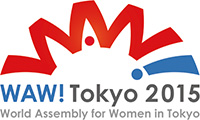
The Government of Japan hosted World Assembly for Women (WAW!) on August 28-29, 2015. In the 2nd WAW!, a total of 145 leaders active in various fields of women issues gathered from 42 countries and eight international organizations.
WAW! 2015 was held under the theme of “WAW! for All ~ Together with Women and men of diverse backgrounds and generations ~,” and was attended by women and men from a wide range of status and generations. We asked the experts who have supported us to organize WAW! 2015 on how was the discussion they participated and how they utilize the lessons learned at WAW! for their future initiatives and activities. (Interviewees: Ms. Asako Osaki, Director, Gender Action Platform, Ms. Ayako Ota, Leader of “Sales Department Girls Section Association”, Ms. Momoko Shirakawa, journalist specializes on the repot of declining birth rate issue, Mr. Tetsuya Honda, Managing Director/ CEO, Blue Current Japan, and Ms. Akiko Yuge, Professor, Faculty of Law, Department of Global Politics Hosei University/ Interviewer: Director, Foreign Policy Bureau, Gender Mainstreaming Division )
―Please tell us what the appeal of WAW! is. Is there any change after your participation in WAW!?
Yuge: WAW! covers a wide range of issues about gender, and a variety of participants discussed these issues that reach beyond their respective sectors. I could see different aspects of gender, which I used to see with the viewpoint of development. I participated in WAW! two years in a row, and found that the participants could speak freely and there was no formal atmosphere - in a good sense, which invigorates the discussion. This is the most attractive aspect of WAW!.
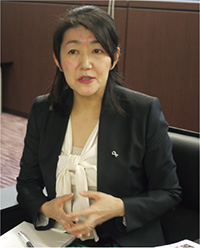 Momoko Shirakawa (journalist specializes on the report of the declining birth rate issue)
Momoko Shirakawa (journalist specializes on the report of the declining birth rate issue)Shirakawa: I participated in WAW! 2015 for the first time and found the meeting was very exciting and powerful as many active people in women related field in the world assembled. Also, I realized Japan is in a very difficult position, because while Japan assists developing countries, Japan is also a developing country itself in the context of women’s empowerment. On the other hand, in the discussion on the millennium generation, I learned it was common in the world, whether in the U.S., in Thailand, and elsewhere, that young generations seek a work-life balance in their lives rather than money. After WAW!, I established “Study Group on Working Styles of the Millennium Generation” with women in their twenties.
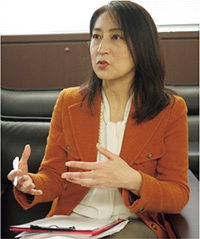 Asako Osaki (Director, Gender Action Platform)
Asako Osaki (Director, Gender Action Platform)Osaki: I was a moderator for the session of “Women’s empowerment through sanitation” and it was very interesting experience. Although the diffusion of safe and hygienic bathroom facilities is directly connected to women’s dignity and human rights, it has not been focused on for a long time. On this theme, leaders such as Administrator Clark of the United Nations Development Programme (UNDP), Special Representative Bangura of the UN Secretary-General on Sexual Violence in Conflict, Ambassador Wadona, Indian Ambassador Extraordinary and Plenipotentiary to Japan, and Minister Arimura for Women’s Empowerment of Japan, made presentations and discussed the importance of bathroom facilities in light of their experiences. Ms. Yamagami, who developed anhydrous toilets at LIXIL Corporation, and popularized them in Kenya, presented some concrete solutions. I think this is one of special features of WAW! which has participants from diverse backgrounds. When Prime Minister Abe came by at the session, he asked Ambassador Wadowa if there is anything that he can do to solve the problem in India. She answered, “We want you to export Ms. Yamagami to India!.” I am convinced that if the number of female engineers increases in the private sector, the fields in which they can make contributions will expand globally. Let’s increase the number of Rikejo (science-oriented women in Japanese)!
Honda: I participated in WAW! as the only male advisor, and had a very valuable experience. At WAW!, I attended the session “Engaging Men in Reforms.” Listening to the stories from Swedish, Australian and other male participants, I was surprised to learn how deep their understanding on women’s empowerment in society is. I realized that I only had fragmented knowledge about gender issues. Taking part in the advisors’ meetings prior to WAW!, I was able to deepen my understanding about this issue. Since I found myself changed, I hope that more men will participate in WAW!.
―Were there any words, comments, or suggestions that impressed or encouraged you at WAW!? And, do you have any examples which led to your new activities or initiatives?
Osaki: In the public forum, elite women from the world made presentations. Surprisingly, however, they had a variety of backgrounds such as a single mother, four sisters from rural area, and an immigrant. There was one common thing in their stories–that is, they have grown up being told by their parents: “There are no limits to your potential.” When it comes to factors determining the future of girls, I realized how critical they are affected by their parents’ view on gender or how they were told. In my future activities, I want to convey such message to Japanese girls.
Interviewer: We heard powerful messages in the public forum. I was greatly impressed by the word of President Sirleaf of Liberia, “The dream is not big enough if it doesn’t scare you.”
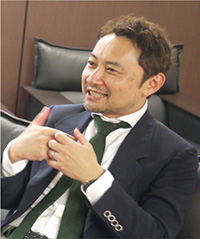 Tetsuya Honda (President, Blue Current Japan)
Tetsuya Honda (President, Blue Current Japan)Honda: When I had a talk with Ambassador Melanne Verveer, I was very impressed by her words, “The current system is one established before women became active in society. Further dynamic reform is required.” Now I feel that women’s empowerment is not a challenge just for women but also a reform to review the social structure itself. I would like to spread this idea more among men. In the session, I said, “We should say ‘lifestyle revolution’ rather than ‘women’s empowerment’.” More foreign participants, not Japanese participants, agreed with me. I was encouraged to learn that there were people who support my idea in the world, though it is still difficult to get support in Japan.
―What do you expect from WAW! in the future? Do you have any ideas to make WAW! more meaningful?
Osaki: Sustainable Development Goals (SDGs) were formulated last year (2015).
Japan used to be in a position just to support it but now it becomes one of the concerned parties as well. People are watching how Japan will take the lead to tackle the SDGs, including goals on gender. If you take up SDGs including goals on gender at the next WAW!, I think it will make a great impact.
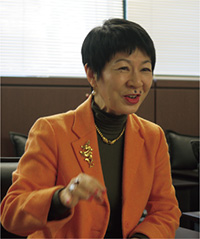 Akiko Yuge (Professor of Department of International Politics, Faculty of Law, Hosei University)
Akiko Yuge (Professor of Department of International Politics, Faculty of Law, Hosei University)Yuge: In the session I attended, we discussed how to take advantage of the private sector’s know-how to solve problems in developing countries. It is becoming absolutely necessary to derive synergy effects through cooperation among businesses, governments and international organizations. In that sense, I suggest to discuss on how women are described in the “media,” which involves a variety of stakeholders. Also, since the year 2015 saw a progress in the field of development so that 2016 will be the first year to follow up. “Climate change” should also be discussed as the Paris Agreement was signed. I hope WAW! will become an occasion to deliver messages to the international community.
Shirakawa: I hope we can train people to act for social reform through WAW!. If people living in rural areas, where information is not easily available, participate in WAW!, I think they will get a chance to see at the world. In that sense, how about setting up a “WAW! quota” giving women an opportunity to study abroad?
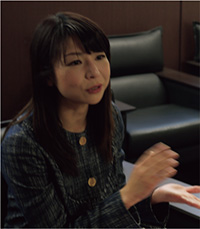 Ayako Ota (Representative Director, Women’s Team of Sales Division)
Ayako Ota (Representative Director, Women’s Team of Sales Division)Ota: Last year, the Sales Department Girls Section Association collaborated with Google. We collected opinions from all over Japan including rural areas and disseminated them. Through the activities, we were able to understand the situation of women in rural areas. We want to utilize the network from last year (2015), and further promote regional activities, such as holding a “mini WAW!” in rural areas.
Honda: “Women’s empowerment” is not just an issue relating to the working population. I think that in Japan, where women do not yet play active role, many products and services lack the feminine perspective. It means that Japan’s ‘soft power’ is weak in the global context. I hope we can also send a message from a new perspective that you never win in the global market without incorporating women’s sensibilities.
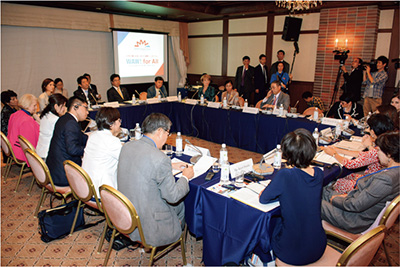 WAW! 2015 subgroup session (Photo: Cabinet Public Relation Office)
WAW! 2015 subgroup session (Photo: Cabinet Public Relation Office)We will hold WAW! this year. Powerful messages delivered by leaders around the world should encourage each other to further energize their efforts. Furthermore, in Japan, where women’s empowerment has not yet achieved to the full extent, we will encourage men and women from local communities to take part, so that movement for a change in lifestyle will be created.
There are still a variety of issues remaining in the world, such as poverty, violence, conflict and terrorism, as well as social practice that deprive women’s social, economic and political opportunities. Under the Abe Administration, Japan is taking a variety of initiatives toward creating “a society where women shine.“ One of those efforts is the establishment and implementation of the “National Action Plan” (NAP) to implement the UN Security Council Resolution 1325 and its related resolutions. So what is the Security Council Resolution 1325, which sparked the establishment of the NAP?
[Security Council Resolution 1325, a symbolic resolution on women, peace and security]
Security Council Resolution 1325, adopted by the UN Security Council in 2000, is the first resolution to connect women with peace and security issues. The Resolution, while recognizing that women are affected by conflicts, requests the member states to promote women’s active participation and protect women’s human rights in all stages from conflict prevention and resolution to post-conflict peace-building. The Resolution also seeks to mainstream a gender perspective in all activities related to peace-building.
[Features of Japan’s NAP]
There are four elements expected to be included in the course of development of “National Action Plan”, which encourage the implementation of the Resolution. These four elements are as follows :
a) Prevention of all forms of violence against women and girls during conflict and post-conflict, b) women’s participation in decision-making with regards to peace and security at national, regional and international levels, c) promotion of human rights protection of both women and girls during conflict and post-conflict, and d) addressing particular needs of women and girls and capacity building of women in humanitarian and recovery assistance.
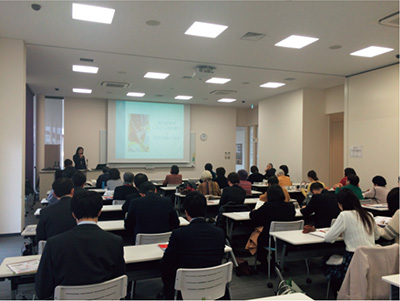 The seminar held in Fukuoka in January 2016. In the seminar, Japan’s NAP was reported as well as Japan’s efforts and the global situation.
The seminar held in Fukuoka in January 2016. In the seminar, Japan’s NAP was reported as well as Japan’s efforts and the global situation.To promote women’s participation in decision making processes and incorporate women’s human rights and a gender perspective into the field of peace and security, Japan’s NAP has designated indicators including official development assistance (ODA) and UN peacekeeping operations (PKO) policy under the five pillars of participation, conflict prevention, protection, humanitarian and reconstruction assistance, and monitoring and evaluation. Especially, it is worth noting that Japan’s NAP addresses issues both domestic and international as well as not just relating to conflict-zone situations but also natural disasters.
Japan’s NAP was established in September 2015. In proceeding to the implementation phase, we intend to play a more significant role in the field of women, peace and security.


